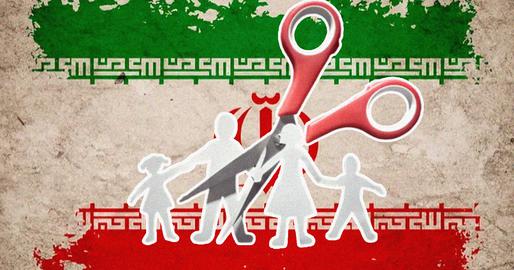The prison authorities of the Islamic Republic have been fueling addiction among political prisoners, IranWire reveals.
Ward 3, also known as the "Methadone, Tuberculosis, and AIDS" ward at Shiban Ahvaz Prison, houses approximately 1,300 inmates, including prisoners from other wards, notably political and religious detainees.
IranWire's sources indicate that Abdul Hossein Gholamnejad, the head of security at Shiban prison, is involved in transferring political and ideological prisoners to this facility.
A Sunni prisoner, detained for "preaching" religion and relocated to Shiban prison for three months, disclosed to IranWire that prison authorities initially provided methadone free of charge, citing drug addiction concerns.
However, access has now been restricted to a limited daily dosage, and diluted methadone is sold to inmates at exorbitant prices.
IranWire conducted interviews with multiple credible sources, including former political and ideological prisoners with experience at Shiban prison.
B2 Tablets and Methadone: Exploiting Addiction in Prisons
Recent reports shed light on the alarming trend of B2 tablet distribution alongside methadone in Iranian prisons, particularly targeting political and ideological detainees.
Human rights organization Karun uncovered attempts to introduce these addictive substances into Shiban prison, where political prisoners are housed, under the guise of combating addiction.
The B2 pill, or Buprenorphine, known for its addictive properties, is being administered alongside methadone in some de-addiction programs.
However, in Shiban prison's Ward 3, authorities justify the distribution of these drugs as part of addiction treatment, only to facilitate their sale among prisoners, particularly targeting political detainees.
Former inmates reveal a sinister scheme where these substances are priced significantly lower in political prisoners' cells compared to other wards, hinting at a deliberate strategy to foster addiction among detainees.
Sources confirm the collusion between prison authorities and drug dealers, exacerbating the situation and creating a lucrative underground market within the prison walls.
The exploitation of addiction not only perpetuates a cycle of dependency but also raises concerns about the complicity of security institutions in fueling addiction among political prisoners.
According to a former political and ideological prisoner, "the center of distribution of this material is Sepidar prison in Ahvaz. Sepidar prison is the largest storage tank and distributor of this substance to other prisons in Khuzestan."
Another source reveals that methadone, sealed in buckets, is sent in concentrated form to prisons monthly, based on usage statistics provided by each prison.
IranWire's sources indicate that prison officials dilute the concentrated methadone with water before distributing it in syrup form in disposable cups.
Explaining the distribution process, an informant states: "Prison health provides a list. An officer in a special cubicle pours diluted methadone into a disposable cup for each prisoner, who must consume it in the officer's presence. However, some prisoners either play pranks or engage in altercations."
Initially, methadone was provided free of charge, but once addiction was apparent, free quotas were cut, and prisoners were required to pay.
A former prisoner recalls that five years ago, those with moderate drug use paid 50,000 tomans weekly for the drug.
It's estimated that each prisoner in this ward contributes several hundred thousand tomans weekly to prison revenue due to inflated prices.
The smuggling of drugs into prisons is a global issue, including in Iran, where methadone and B2 pills are officially distributed under the pretext of addiction cessation.
IranWire's "Prison Narratives" series exposes the inhumane treatment of prisoners and the profitable nature of drug distribution, labelled as "big business," evident in facilities like Rajaeeshahr prison in Karaj and Greater Tehran.
In a revealing 51-minute video clandestinely recorded by a prisoner in Rajaeeshahr prison, inmates are seen scavenging packages dropped by authorities in the air-conditioning yard, which often contain drugs.
Previously, imprisoned Mohammed Sharifi-Moghadam disclosed that drugs are tossed into air vents by prison officials at specific times, highlighting a lucrative trade where materials worth five million tomans can fetch 50 million tomans once inside the prison.
"Methadone Ward is the Last Floor of Hell"
Describing the Shiban methadone ward as "the last floor of hell," an informed source paints a grim picture of rampant sexual assault, unsafe drug use, and inadequate tuberculosis and AIDS treatment.
The overcrowded conditions, coupled with the lack of proper quarantine measures, pose a significant health risk not only to prisoners but also to their families and associates.
The so-called "Sharia meeting," arranged by the Prisons Organization, facilitates sexual relations between married prisoners and their spouses, further complicating the already dire situation.
Former political prisoners reveal the appalling conditions within the methadone ward, where overcrowding forces inmates to sleep on the floor and navigate cramped, unsanitary living spaces.
Instead of providing effective addiction treatment, authorities perpetuate dependency by administering methadone without proper rehabilitation measures.
Lack of access to basic amenities such as sanitary facilities and medicine exacerbates the prisoners' suffering. Bathrooms without doors and unhygienic conditions illustrate the neglect and disregard for inmates' well-being.
Inmates addicted to methadone struggle to maintain basic hygiene standards, further deteriorating the already dismal conditions.
The situation is compounded by the poor quality of piped water in Ahvaz, forcing prisoners to resort to drinking from unhygienic sources.
Methadone Ward: Punishment for Political and Ideological Prisoners
Reports obtained by IranWire reveal that Shiban prison authorities exploit the methadone ward as a punishment and exile camp, particularly targeting inmates from other prisons, especially those incarcerated for political and religious reasons.
A source from Ward 8 of Shiban prison recounts their experience, stating, "Most political prisoners in Shiban suffer from tuberculosis, having contracted it during their incarceration. I am one of them, having spent three months in Ward 3 where I contracted tuberculosis."
"Informants within the prison report political and security prisoners to guards, leading to their transfer to the methadone ward as punishment."
Describing a confrontation with prison guard Abdul Hossein Gholamnejad, the source sheds light on the arbitrary nature of such transfers: "Gholamnejad accused me of causing chaos in the prison due to my activism. I challenged him, pointing out the surveillance cameras. Despite my innocence, I was transferred to ward 3 under the pretext of a temporary arrangement, only to spend three months there with worsening health conditions."
Multiple IranWire sources corroborate this practice, highlighting authorities' deliberate disregard for inmates' health and medical needs.
Prison officials exploit the dire conditions and lack of medical care within the methadone ward, selectively sending prisoners deemed troublesome or politically active from other wards.





























comments